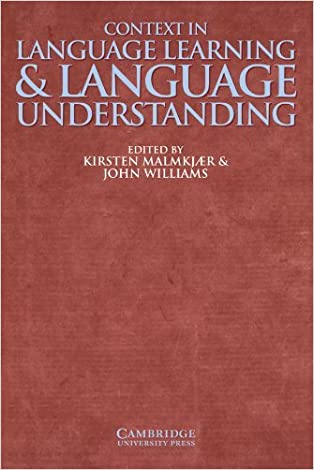 The papers in this volume represent the views of a range of experts in a variety of language-related disciplines on the role which context plays in language learning and language understanding. The authors provide various theoretical constructs which help impose order on the apparent chaos of contextual factors which may have an influence on the production and comprehension of speech events. They focus on a variety of types of context, including the context established by different speech communities, interpersonal contexts, the classroom context, and the context provided by the linguistic code itself. The papers illustrate how the treatment of context varies across the disciplines of linguistics, historical stylistics, applied linguistics, and psycholinguistics. Each paper is prefaced by an editorial introduction to help the reader trace out common themes and points of conflict.
The papers in this volume represent the views of a range of experts in a variety of language-related disciplines on the role which context plays in language learning and language understanding. The authors provide various theoretical constructs which help impose order on the apparent chaos of contextual factors which may have an influence on the production and comprehension of speech events. They focus on a variety of types of context, including the context established by different speech communities, interpersonal contexts, the classroom context, and the context provided by the linguistic code itself. The papers illustrate how the treatment of context varies across the disciplines of linguistics, historical stylistics, applied linguistics, and psycholinguistics. Each paper is prefaced by an editorial introduction to help the reader trace out common themes and points of conflict.
 The papers in this volume represent the views of a range of experts in a variety of language-related disciplines on the role which context plays in language learning and language understanding. The authors provide various theoretical constructs which help impose order on the apparent chaos of contextual factors which may have an influence on the production and comprehension of speech events. They focus on a variety of types of context, including the context established by different speech communities, interpersonal contexts, the classroom context, and the context provided by the linguistic code itself. The papers illustrate how the treatment of context varies across the disciplines of linguistics, historical stylistics, applied linguistics, and psycholinguistics. Each paper is prefaced by an editorial introduction to help the reader trace out common themes and points of conflict.
The papers in this volume represent the views of a range of experts in a variety of language-related disciplines on the role which context plays in language learning and language understanding. The authors provide various theoretical constructs which help impose order on the apparent chaos of contextual factors which may have an influence on the production and comprehension of speech events. They focus on a variety of types of context, including the context established by different speech communities, interpersonal contexts, the classroom context, and the context provided by the linguistic code itself. The papers illustrate how the treatment of context varies across the disciplines of linguistics, historical stylistics, applied linguistics, and psycholinguistics. Each paper is prefaced by an editorial introduction to help the reader trace out common themes and points of conflict.